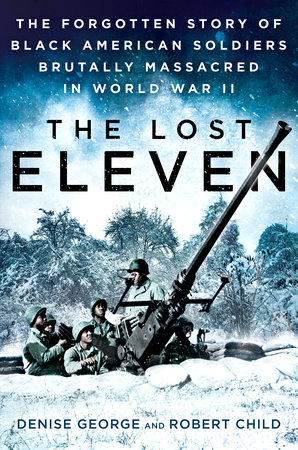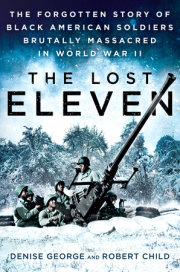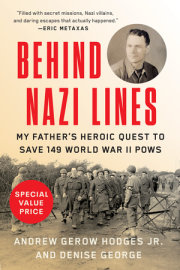Chapter 1
A Quiet Forest
- Ardennes Forest, Belgium - December 16-17, 1944
Snow falls from a tree branch in an odd, unnatural way. Sergeant Aubrey Stewart notices the slight movement in the trees on the edge of the Ardennes, the dark, almost mythical forest stretching out before him, miles into enemy territory. He shivers as he stands in snow, wearing worn-out boots and last summer's uniform, squinting his eyes, straining to peer through the heavy fog.
Nothing's happening at the "ghost front."
Sergeant Stewart and the black GIs of the 333rd Field Artillery Battalion, stationed at the Siegfried Line, are restless and bored as they wait for the war to end. For months, they have guarded the quiet Belgian-German border, Allied and Axis front lines separated by concrete dragon teeth, barbed wire, and land mines.
Stewart lifts his eyes when he sees another movement in the trees. Suddenly the predawn sky lights up with fireworks! Rockets from German Nebelwerfers scream as they sail from the east, exploding in treetops, shattering large branches, and sending the sharp, stabbing spears down onto the GIs. The 333rd artillerymen load the mighty 155mm howitzers, positioning them east toward the Ardennes, and launch deadly shells miles into the foggy distance. All morning, all day, and all night, the Germans' "Screaming Meemies" and mortars pockmark their campgrounds, wounding and killing the men of Able, Baker, Charley, and Service batteries stationed near the front lines.
Early the next morning, the GIs are hurt, hungry, and exhausted from their nonstop firing. Their ammunition is almost gone. They don't know how much longer they can hold out. Suddenly, as if in a surreal dream, thousands of Germans clad in white winter gear run toward them, screaming as they burst through the fog-shrouded forests.
"We're under attack!" Stewart shouts to his comrades.
Before his eyes, streams of enemy soldiers emerge, attacking like feral animals, their eyes wide and wild, faces grotesquely distorted, yelling with an otherworldly, fanatical fury. They strike, setting up MG-42 machine guns, firing on the artillerymen and mowing them down.
Stewart bends over, grabs a wounded man, and hoists him onto his shoulders. As he bolts across the campground, he hears the sickening thud of a bullet slam into the skull of the man he carries. He feels the man's body jerk and then go limp. Blood trickles down his neck from the hole in the GI's head. Darting behind a tree, Stewart lays the lifeless soldier on the ground, the man's eyes open and fixed, brow and face bloody.
In a nearby foxhole, a GI stands up. His body is ripped in two by automatic weapon fire. Shells and mortar fragments sail overhead, exploding and sending shrapnel into men's bodies. Private Curtis Adams, the 333rd's medic, races from one fallen soldier to the next. Some he can help; others are already gone, blown apart, their body parts scattered on the ground.
Around Stewart are fellow GIs, caught unawares by the unexpected ambush, lying facedown, their arms and legs sprawled out on the icy ground.
Some are lifeless; others moan in pain, bleeding profusely. The mighty 155mm howitzers-the pride and firepower of the 333rd-sit eerily still and silent in the falling snow. Depleted of ammunition, their massive barrels and powerful shells are useless with the enemy so near.
Sergeant Thomas Forte, Private George Davis, and other GIs grab the few rifles and carbines available and fire until the ammunition runs out. The enemy continues to pour from the forests like water flowing from an endless fountain. Sergeant George Shomo finds a trench knife, then attacks, stabbing and killing two Germans. The 333rd, their ammunition gone, fight well-armed Germans in hand-to-hand combat, leaving both wounded and dead on the Ghost Front's battlefield.
Stewart, Forte, Davis, Adams, and the surviving GIs grab injured comrades and race to the waiting trucks at the corner of the campground. The drivers gun their engines as the GIs scamper into the backs of the trucks.
"Go! Go! Go!" they shout to the drivers.
German soldiers follow them to the trucks, shooting at them, grabbing arms and legs, and trying to pull them out. The drivers flatten the trucks' accelerators, and with tires spinning on the icy road, they race toward the Our River Bridge.
Chapter 2
The Berlin Olympics
- Berlin, Germany - August 1, 1936
For the past two years, Berlin has dealt with torn-up streets and buildings wreathed in scaffolding as it prepares for the Olympic Games taking place in this city. Now, in the summer of 1936, the work is finally finished. The Germans stand back and admire their scrubbed and scoured city, decked out with newly planted trees and flowers and illuminated with rows of electric lights. They eagerly await the arrival of one hundred thousand visitors from around the world.
The awarding of the XI Olympic Games to Germany, a benevolent decision made in May 1931 by the International Olympic Committee, has caused considerable international controversy. The world is aware of Nazi abuse of Jews and others they deem "racially undesirable." Most German Jewish athletes are excluded from Germany's sports and recreational facilities, having been expelled for racial reasons.
The IOC's invitation to Berlin comes as a goodwill gesture meant to publicly welcome Germany back into the world community after her humiliating defeat eighteen years before in the Great War. But Hitler cares little about sports, including hosting the prestigious Olympics.
"I do not want to have the games here," he tells Propaganda Minister Joseph Goebbels in 1931.
But the wily Goebbels convinces him to accept the award for Germany's sake.
"My FŸhrer, we can showcase our 'new Germany' at the Berlin Olympics, demonstrating international goodwill, and perhaps changing the opinions of those who so strongly oppose us. It will give us an unrivaled opportunity to end all foreign prejudice against our Vaterland. And just think of the money the event will bring when one hundred thousand internationals arrive in Berlin."
Hitler frowns, agreeing reluctantly to host the event.
"If nothing else," Hitler says, "perhaps the games will be a good opportunity to show off our Aryan athletes, demonstrating to the world their racial superiority."
After Germany makes the formal commitment to host the Berlin Olympics, Hitler's administration begins building a 325-acre sports complex 5 miles west of Berlin. The all-natural stone stadium seats 110,000 sports fans and costs the Reich a whopping 42 million Reichsmarks.
Not everyone favors choosing Berlin as the Olympic site. As late as November 1935, Hitler learns that Ernest Lee Jahncke, an American member of the International Olympic Committee (IOC), opposes the location.
"Neither Americans, nor the representatives of other countries, can take part in the games in Nazi Germany without, at least, acquiescing in the contempt of the Nazis for fair play and their sordid exploitation of the games," Jahncke writes to the International Olympic Committee.
Shortly thereafter, the IOC expells Jahncke from the committee.
Chapter 3
The Banning
- Berlin, Germany - Summer 1936
As the opening day of the 1936 Olympic Games draws near, Hitler orders Berlin shopkeepers to remove racially discriminating signs and slogans from store windows. He also transports "undesirable" people from the city's streets. With open arms, Berlin waits for the hordes of international crowds to pour into their city, ready to welcome them with red-carpet enthusiasm, brown-shirted bands, lavish receptions, and a profusion of Olympic flags displayed beside swastika-emblazoned flags.
With few exceptions, Hitler bans Germany's non-Aryans from participating in the games, including Jewish athletes, Gypsies, people of color, and all those considered racially inferior, blatantly violating Olympic codes of participation equality. Because of this, Hitler learns that some nations will boycott the games. He clenches his teeth, loudly cursing each country that dares to boycott the Fatherland. After some time, however, most of the world decides to participate, including the United States.
At the end of July, Hitler welcomes the U.S. Olympic team: who sends 312 athletes, including 18 African-Americans and 5 Jews.
When the International Olympic Committee officials demand that the FŸhrer embrace black and Jewish participants, he narrows his eyes, begrudgingly assuring the committee: "Germany will treat the Negro athletes agreeably while they are here. And we will allow the foreign Jewish athletes to participate as well."
Hitler is angered when he learns that many of the world's Jewish athletes will boycott the competition, publicly displaying their disapproval and distaste for Hitler and his anti-Semitism. Most U.S. black athletes, however, decide to participate, arguing that their athletic victories will undermine Nazi Germany's myth of Aryan supremacy and, at the same time, foster a new sense of black pride at home.
Dark clouds form overhead when, on August 1, 1936, more than five thousand athletes from fifty-one nations march into HitlerÕs new stadium on the opening day of the Berlin Summer Olympic Games. Adolf Hitler, his head held high, leads Olympic and German officials, as well as prestigious international guests, to prominent stadium seats while three thousand Germans sing proudly the ÒDeutschland †ber AllesÓ national anthem. In respect for their FŸhrer, thousands of loyal Germans crowd the stadium, standing, thrusting their right arms forward in the Hitler salute, and shouting ÒHeil, Hitler.Ó
The Hindenburg airship flies low over the stadium as Hitler stands and officially announces: "I proclaim the Games of Berlin, celebrating the eleventh Olympiad of the modern era, to be open!" The crowds roar with enthusiasm. Richard Strauss's "Olympic Hymn" plays triumphantly on loudspeakers throughout the stadium.
The FŸhrer sits stiffly, his hands balled into fists, as he watches American track star Jesse Owens win multiple awards. ÒAmericaÕs Black Auxiliaries,Ó he calls the eighteen African-Americans who participate, as if they were second-class team members. German journalists refer to Owens as the ÒNegro Owens,Ó the son of an Alabama sharecropper, and the grandson of a former slave. With each medal Owens wins, Hitler pouts, angry that the black Alabama-born athlete is publicly debunking his Aryan myth.
"And what is your reaction to this?" Hitler asks Joseph Goebbels.
"My FŸhrer," Goebbels says, shaking his head in disapproval, "the victories by America's African-Americans [are] a disgrace."
Jesse Owens garners one medal after another, setting a new world record in the long jump and becoming an instant superstar in Germany. Fans chant his name when he walks into the stadium, and stop him in the streets begging for his autograph.
Near the end of the games, a reporter for the New York Times writes:
"One almost certain Negro champion [at the Berlin Olympics] seems to be Jesse Owens. 'Buckeye Bullet' strode through his 100-meter first-round heat . . . without pressing himself in the slightest degree [and] equaled the world and Olympic record of 0:10.3. . . . Victory for him tomorrow in the final seems to be his merely for the asking."
But, unlike the white medal-winning athletes, the black U.S. Olympic star never has the opportunity to meet the FŸhrer in person. Purposely ignoring expected Olympic protocol, Hitler storms out of the stadium after Owens's final win, refusing to personally receive him or the other award-winning black athletes.
"Hitler refused to shake Jesse Owens's hand or congratulate other black medalists," a reporter states in the Baltimore Afro-American newspaper.
Almost five thousand miles away, Jesse OwensÕs wins make black people proud, especially one eighteen-year-old, LilÕ Georgie Davis, a native of Bessemer, Alabama.
Chapter 4
A Wall of Photographs
- Bessemer, Alabama - Autumn 1936
Davis and his only son, Lil' Georgie, sit in the front room of their small Bessemer house on the eve of Georgie's eighteenth birthday. Georgie clips a photograph of 1936 Olympic star Jesse Owens from the Bessemer Herald. In the picture, Owens is dashing across the Berlin Olympic finish line, winning the hundred-meter quarterfinal. Georgie pins Owens's snapshot on the front room wall that displays the Davis family photographs.
"He's gotta be the greatest athlete in the world," Georgie says, beaming with pride. "Daddy! Can you believe Jesse Owens won four Olympic gold medals?!"
"That Owens boy makes us black Alabamians proud," Davis says. "Guess he showed that Hitler monster a thing or two about colored athletes." He smiles, slapping his knee. "Wish I could've been a fly on Hitler's head when Jesse beat all those Krauts!"
The Davises, like other Alabama families still suffering the effects of the Great Depression, need some encouraging news. The nation's sudden economic collapse back in 1929 hit Alabama especially hard. Davis and his family, like other poor blacks in the southern United States, still endure Depression-caused poverty and find no relief in sight.
"Lil' Georgie," his father says, "it's good to see a poor sharecropper's son do so good in sports. I know his daddy's proud of him."
He points to the photographs of distant family members hanging on the wall. "His people, like ours, worked long, exhausting days. The Owens men worked the farms while our family's men toiled in Birmingham's coal and steel plants and on railroads. Not been easy for any of us, Lil' Georgie. We're still struggling to keep a roof over our heads. But it's good that the Owens boy's done so well."
"I'm gonna do good, too," Georgie says, grinning. "One day you're gonna be so proud of me."
"I'll always be proud of you, son, no matter what you do-or don't do. You've got nothing to prove to me."
That afternoon, alone in the front room, Davis reflects on his past, his family, and his son, LilÕ Georgie.
I tried so hard to make sure Lil' Georgie got a good education, unlike most Alabama colored boys. At least my boy has three years of high school under his belt.
Even now, in 1936, Davis knows that education for Alabama's black kids is dismal, taking place in windowless schoolhouse shacks with dirt floors, heated by old coal stoves. In the early part of the century, when Davis was a boy, Bessemer parents "graduated" their children out of grammar school and put them straight into Alabama's pig iron factories. Every able-bodied person, no matter how young or old, was needed to help put food on the family table.
Davis glances at the wall's photograph of Georgie on his first day of school. He's smiling big, ears clean, hair cut and combed, and wearing a crisp grade school uniform, a red plaid satchel held tightly in his hand.
You've been blessed, Lil' Georgie, to get educated. Few poor boys are so lucky.
Davis wanted his son to get a good education. Some of the more fortunate black children around Birmingham got to attend the better schools built and run by the Tennessee Coal, Iron, and Railroad Company (TCI). But Davis didn't work at TCI, so Lil' Georgie wasn't eligible to attend. Davis looks to the ceiling and smiles. Thank you, Lord, and thank you, Mr. Rosenwald.
Davis had had the opportunity to enroll Georgie in one of the Rosenwald schools, built and funded by Illinois-born philanthropist Julius Rosenwald, the first president of Sears, Roebuck and Company. Out of the goodness of his heart, Mr. Rosenwald set up more than five thousand special schools for poor black children in the South's hard-hit rural areas.
Copyright © 2017 by Denise George. All rights reserved. No part of this excerpt may be reproduced or reprinted without permission in writing from the publisher.








